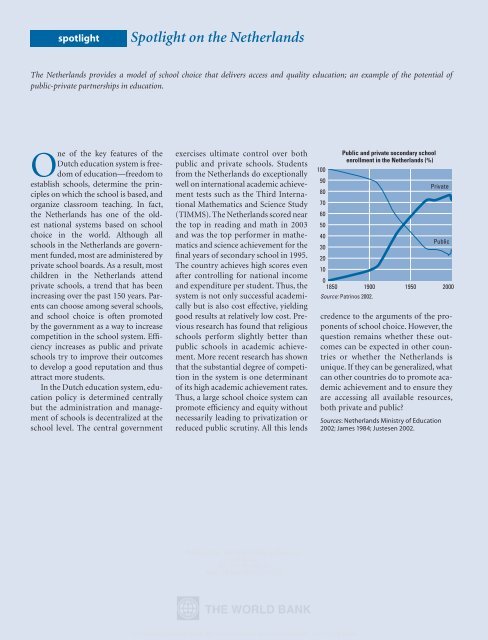The Role and Impact of Public-Private Partnerships in Education
The Role and Impact of Public-Private Partnerships in Education
The Role and Impact of Public-Private Partnerships in Education
Create successful ePaper yourself
Turn your PDF publications into a flip-book with our unique Google optimized e-Paper software.
spotlight<br />
Spotlight on the Netherl<strong>and</strong>s<br />
<strong>The</strong> Netherl<strong>and</strong>s provides a model <strong>of</strong> school choice that delivers access <strong>and</strong> quality education; an example <strong>of</strong> the potential <strong>of</strong><br />
public-private partnerships <strong>in</strong> education.<br />
One <strong>of</strong> the key features <strong>of</strong> the<br />
Dutch education system is freedom<br />
<strong>of</strong> education —freedom to<br />
establish schools, determ<strong>in</strong>e the pr<strong>in</strong>ciples<br />
on which the school is based, <strong>and</strong><br />
organize classroom teach<strong>in</strong>g. In fact,<br />
the Netherl<strong>and</strong>s has one <strong>of</strong> the oldest<br />
national systems based on school<br />
choice <strong>in</strong> the world. Although all<br />
schools <strong>in</strong> the Netherl<strong>and</strong>s are government<br />
funded, most are adm<strong>in</strong>istered by<br />
private school boards. As a result, most<br />
children <strong>in</strong> the Netherl<strong>and</strong>s attend<br />
private schools, a trend that has been<br />
<strong>in</strong>creas<strong>in</strong>g over the past 150 years. Parents<br />
can choose among several schools,<br />
<strong>and</strong> school choice is <strong>of</strong>ten promoted<br />
by the government as a way to <strong>in</strong>crease<br />
competition <strong>in</strong> the school system. Efficiency<br />
<strong>in</strong>creases as public <strong>and</strong> private<br />
schools try to improve their outcomes<br />
to develop a good reputation <strong>and</strong> thus<br />
attract more students.<br />
In the Dutch education system, education<br />
policy is determ<strong>in</strong>ed centrally<br />
but the adm<strong>in</strong>istration <strong>and</strong> management<br />
<strong>of</strong> schools is decentralized at the<br />
school level. <strong>The</strong> central government<br />
exercises ultimate control over both<br />
public <strong>and</strong> private schools. Students<br />
from the Netherl<strong>and</strong>s do exceptionally<br />
well on <strong>in</strong>ternational academic achievement<br />
tests such as the Third International<br />
Mathematics <strong>and</strong> Science Study<br />
(TIMMS). <strong>The</strong> Netherl<strong>and</strong>s scored near<br />
the top <strong>in</strong> read<strong>in</strong>g <strong>and</strong> math <strong>in</strong> 2003<br />
<strong>and</strong> was the top performer <strong>in</strong> mathematics<br />
<strong>and</strong> science achievement for the<br />
f<strong>in</strong>al years <strong>of</strong> secondary school <strong>in</strong> 1995.<br />
<strong>The</strong> country achieves high scores even<br />
after controll<strong>in</strong>g for national <strong>in</strong>come<br />
<strong>and</strong> expenditure per student. Thus, the<br />
system is not only successful academically<br />
but is also cost effective, yield<strong>in</strong>g<br />
good results at relatively low cost. Previous<br />
research has found that religious<br />
schools perform slightly better than<br />
public schools <strong>in</strong> academic achievement.<br />
More recent research has shown<br />
that the substantial degree <strong>of</strong> competition<br />
<strong>in</strong> the system is one determ<strong>in</strong>ant<br />
<strong>of</strong> its high academic achievement rates.<br />
Thus, a large school choice system can<br />
promote efficiency <strong>and</strong> equity without<br />
necessarily lead<strong>in</strong>g to privatization or<br />
reduced public scrut<strong>in</strong>y. All this lends<br />
100<br />
90<br />
80<br />
70<br />
60<br />
50<br />
40<br />
30<br />
20<br />
10<br />
<strong>Public</strong> <strong>and</strong> private secondary school<br />
enrollment <strong>in</strong> the Netherl<strong>and</strong>s (%)<br />
<strong>Private</strong><br />
<strong>Public</strong><br />
0<br />
1850 1900 1950 2000<br />
Source: Patr<strong>in</strong>os 2002.<br />
credence to the arguments <strong>of</strong> the proponents<br />
<strong>of</strong> school choice. However, the<br />
question rema<strong>in</strong>s whether these outcomes<br />
can be expected <strong>in</strong> other countries<br />
or whether the Netherl<strong>and</strong>s is<br />
unique. If they can be generalized, what<br />
can other countries do to promote academic<br />
achievement <strong>and</strong> to ensure they<br />
are access<strong>in</strong>g all available resources,<br />
both private <strong>and</strong> public?<br />
Sources: Netherl<strong>and</strong>s M<strong>in</strong>istry <strong>of</strong> <strong>Education</strong><br />
2002; James 1984; Justesen 2002.<br />
Delivered by <strong>The</strong> World Bank e-library to:<br />
unknown<br />
IP : 192.86.100.35<br />
Mon, 30 Mar 2009 12:16:23<br />
(c) <strong>The</strong> International Bank for Reconstruction <strong>and</strong> Development / <strong>The</strong> World Bank
















